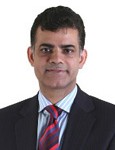 Jones Lang LaSalle India’s Chairman and India Country Head Anuj Puri is attending next week’s World Economic Forum (WEF) meeting in Davos ahead of a critical year for the Indian economy. Here, he narrates what he hopes to get out of the world’s most exclusive meeting of minds.
Jones Lang LaSalle India’s Chairman and India Country Head Anuj Puri is attending next week’s World Economic Forum (WEF) meeting in Davos ahead of a critical year for the Indian economy. Here, he narrates what he hopes to get out of the world’s most exclusive meeting of minds.
Davos 2014
Few national delegations will arrive at the WEF meeting in Davos this year with as much on their minds as the Indians. After a prolonged economic downturn the country has a make-or-break general election expected before May that will, or won’t, deliver the stable government business leaders are hankering for.
Last year the Rupee tumbled against the dollar and foreign investment was lacklustre despite picking up in the final quarter. India’s current account deficit hit a record high and although the Finance Minister has said he expects it to be $20 billion less than expected, figures out last week show slowing export growth. A stable government could brighten this dreary macroeconomic picture.
“Davos is an incredible meeting of movers and shakers from across industry and I want to gauge what their response will be if we end up with a hung parliament and no decisive leadership after the election in a few months’ time.”
“Policy paralysis is never welcomed by the business community. We know that a lot of businesses are sitting on healthy reserves but they’re nervous to spend their money in India because of the political uncertainty.”
“What we need is strong, stable, business-friendly leadership. If this year’s election can deliver that we’ll see the impact straight away. The reason 2013 was so difficult was that limited policy decisions had been taken in previous years. It’s held everything back from liquidity to expansion by real estate occupiers.”
Puri admits that years of slowing growth and political instability have made recent international meetings hard work for Indian industry leaders. But he’s hopeful this month’s WEF meeting in Davos will be an easier ride.
“I’ve been beaten black and blue on international panels!” he states. “Investors are frustrated by the difficulties of doing business in India – corruption, retrospective taxation, a lack of transparency and so on – and they get angry if you’re remotely defensive.”
“But despite the challenges investors remain interested in India because the fundamental growth story remains intact. We have a huge consumer base, a young, educated workforce and a new central bank governor who has already come out with some very good policies. That makes me hope for more positivity at Davos.”
Recent investment from major international funds strengthens that hope. US group Blackstone has invested US$1.7billion of equity capital in India over recent years. The US$181 billion Canadian pension fund, Canada Pension Plan Investment Board (CPPIB), announced its first venture into Indian real estate in December, describing it as a “key growth market.” They committed US$200 million to an office joint investment. The question for Puri is whether others will follow suit.
“These investors go with the philosophy that the current economic slowdown is just a blip. What I want to get a sense of at Davos is whether other investors share this view that fundamentally India is looking good.”
Puri also has America in his sights due to one simple fact: every year since 2005 American companies have leased more real estate space in India than domestic companies. Outsourcing has fuelled that trend and Puri is keen to get a sense of the strength of the US economic recovery and whether it will drive new demand in India.
“One of our major US clients called me last week to say they were doubling the number of new jobs in India to more than 25,000 off the back of new business coming their way in the States.”
Another question for his fellow Davos delegates will be whether last year’s dramatic depreciation of the Rupee could further drive growth as the cost of doing business in India tumbles, pushing up savings for international companies.
“The potential cost-savings of outsourcing to India have been pushed up from about 30-50%. Information Technology is the primary beneficiary but we’re starting to see a positive knock-on effect in export sectors like textiles and pharmaceuticals. I’m already seeing that the weaker Rupee is bringing more business to India and at Davos I want to get a sense of how great an opportunity this might be.”
The Davos summit is a unique opportunity to get insight into these key issues. It gathers more than 3,000 of the world’s most influential leaders, dignitaries, CEOs, government officials and academics, who this year will debate the theme “The Reshaping of the World: Consequences for Society, Politics and Business.” India is sure to take centre stage in that changing world economic order and Anuj Puri looks set to have a busy few days in the Swiss Alps
